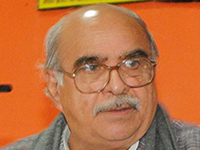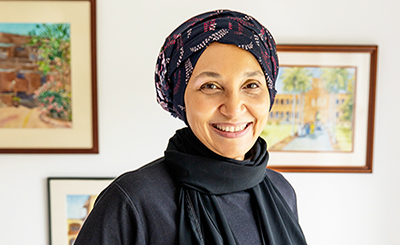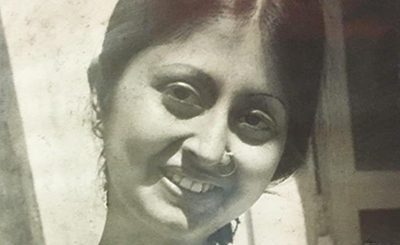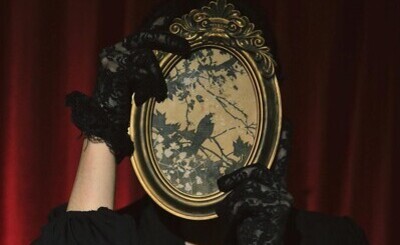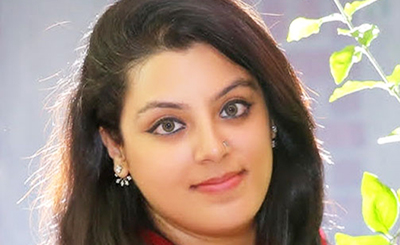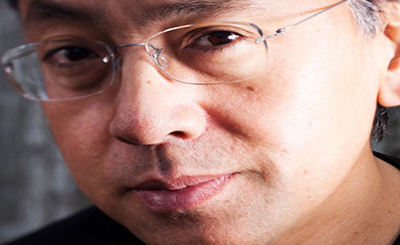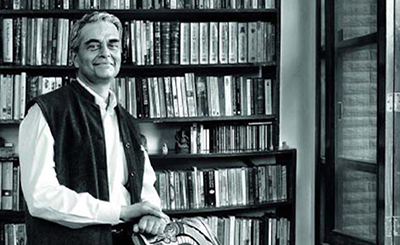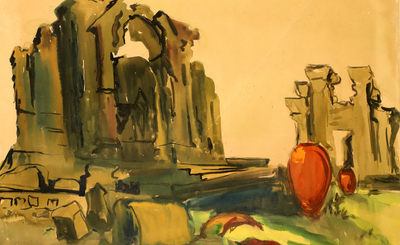
When you will gatecrash into my daughters’ room, screaming slogans will welcome you. You will see a large colourful poster pasted right on the door. Two slogans, scribbled in large fonts, will shock you. One of them will actually descend on you: “Decolonisation and Freedom to Choose”. Superimposed on this are my daughter’s own words in her own handwriting: “Let’s Decolonise This Room”. One more slogan, inscribed in red and blue, accompanies them. It declares: “We wish”.
Now after crossing the door, you are inside the “decolonised room”. But shock will greet you here, too. So, be alert. A 2-ft picture on the front wall will upset you. A wrathful girl stares from this picture. Her innocent eyes are emanating embers. Her face is stiff. Her nostrils flare out. Her hair is disheveled. Her frock is scruffy. She is showing her teeth. Her appearance suggests that she has come out on the road to claim her “selfhood”: “Can anyone impede my path?” Her postures hint that she has been victorious on many fronts and is daring her opponents for the final triumph. The four-worded slogan on the poster is enough to stun her opponents. It says: “It’s My life. Do You Mind It, Do You? No, Right?” Even if her opponents have objection to her life, this warrior lady doesn’t care a bit. She has already taken her position. In front of this poster, there is one 3x3-size poster on the wall. It announces: “Women Hold Up Half the Sky”. Now, decide. Will you still want to gatecrash?
When these posters were pasted, my daughters were 17 and 19. Now, three years have passed. But posters and slogans stay as they were. They are rather looked after with more care. Every Sunday, when the room is cleaned, these posters are also dusted off. As they look clearer, their glare returns and bedazzles my wife and me.
You would be curious to know why we husband and wife feel surprised? There is a reason, a certain reason. See, these “explosively defiant posters” haven’t appeared all of a sudden; they have replaced some other posters. It’s an interesting story of “posters dismissing and replacing posters”. I can still recall faces of those rejected posters. The same 10x12 room used to be full of so many types of iconic faces. Both of my daughters would embellish them. They would worship them. These posters of glamorous faces were bought from footpaths of Connaught Place. It was a galaxy of heart-stealers — Madhuri Dixit, Amitabh Bachchan, Salman Khan, Shah Rukh Khan, Aamir Khan, Hrithik Roshan, Kajol and some Hollywood heartthrobs. I would seethe with anger on this obsession. “What has happened to these girls? Will these filmy figures be their role models? This is not how I am raising them, am I?” I would grill and chastise myself. I would curse myself, too. I would scream at my daughters: “What is this exhibition? Can’t you find pictures of others? There are others, too. Mahatma Gandhi, Karl Marx, Subhash Chandra Bose, Medha Patkar... Don’t they attract you?” My daughters would keep quiet. But, when I would nag them again and again, they would react. “Come on Papa, our time is different from yours. We are doing what is pleasing us. Who cares for Gandhi and Marx in schools and colleges these days? Our generation runs after only likes of Madhuri Dixit, Juhi Chawla, Kajol, Salman,” they would argue. Their arguments would calm me down. I would start doubting myself: “Am I really at fault? They should grow naturally. I can’t impose my role models on them.” Perhaps I was practising to reconcile with my limits. These limits could turn into realities of tomorrow. These realities could assume such forms that might challenge authority of a father and a patriarch simultaneously. Many kinds of doubts started to fill me and I would delve deep into my distant memories.
I have seen many Tanus and Manus in the inner corners of my sleepy village in Rajasthan. I have seen their life cycles. Tanu is handed over a broom. Manu has been ordered to go to jungle every morning to collect wood. Tanu is busy in the kitchen and washing utensils. Manu is feeding the cattle and milking some of them. Tanu is being advised to keep fasts in order to get a good husband. Manu is being asked to make arrangements for evening prayer. Tanu has now grown up and is ready to become a bride. Manu is sad that her brother-in-law is far older than her sister. “Bloody old man,” both of them curse him. Tanu goes to her in-laws. Manu waits for her turn. After two years, Tanu receives a letter that Manu has eloped with some village youngman. Tanu’s parents come to know that their daughter has committed suicide by jumping into the well. The family is not new to the tragedy. Earlier, their aunt had committed suicide. She could not bring dowry with her. The uncle was impotent. A neighbour had sold his child-widowed daughter to an oldman. Tanu and Manu were aware of all these tales; they knew their paths would never lead to school because that was written only in the fate of their brother. There are countless Tanu and Manus in these hinterlands. A number of them have perished. Many more keep dying, without anyone knowing of their plight. There are so many who have turned old and are on the verge of extinction. Some are beaten by their husbands daily; they are buried in the fields and then dug up again and again. Their fetuses are getting aborted and are buried in the backyards. The midwife strangulates it; buries it in some hidden place; throws it into a pond when it is found that the baby is a girl. Does it all happen or is it planned under the supervision of parents? Why didn’t they object to anything?
Oh, what sorts of hinterlands were they? Have they vanished? Have Tanu and Manus been freed of these hinterlands? Where...? A fair is organised every year there. Tanu and Manu are creeping. They are learning to walk. They defecate in their cloth diapers. They urinate in the laps of those holding them. Their noses are running. They are eating the soil. They are playing with dolls. Yes, they both are dolls themselves. Therefore, they are sitting in the laps of elders.
Now, they are no more kids. They are brides. How fast they climbed the ladder of age — infancy, childhood, teenage, age of puberty, and so on. Today, what are they going to become? They are going to become what they are not. They are getting deprived of what they want to become. They are becoming four from two in the laps of their parents. They are entering into wedlock. They are becoming young women from young girls. They are becoming married women. They are becoming wives, mothers, grandmothers, widows and sati. All in the laps of their parents. How fortunate are Tanu and Manu! They have become Sita, Savitri, Laxmi, Durga and many others all at the same time. Even the time has surrendered before them. That's why they are child brides. The state is also oblivious of their plight. Hence, they are in the laps of their parents in the form of brides. How attractive and mysterious is this scene where small girls have turned into women in a few moments! And why shouldn’t it be? It is these moments which gave birth to Sharatchandra’s heroines. I can see the widow houses of Varanasi and Mathura, brothels of Kamatipura, Sonagachi and Meerut in these moments. I can see numerous Draupadis walking with their multiple husbands. They are either spending life with at least two husbands or they are seen lying like chicken pieces in the flesh markets of Meerut, Mumbai, Delhi and Kolkata.
It seems I am still lost in my childhood with Tanu and Manu. I begin to question myself: “Have I grown up? My height is five feet five inches. Then, why do I look like one of two feet? Why are questions of childhood alive in a man above fifty? Why haven’t hinterlands died? Why are Tanu and Manu imprisoned in them? I can see Tanu and Manu have become Roopkanvar. They have been made Bhanwaribai. They have become Phoolan Devi.
The poster “Women Hold Half of The Sky” catches my fancy again. The content of the slogan echoes in my head, like someone is wielding a hammer. One more reality is about to take birth. Tanu and Manu argue with me. They don’t agree now. Now, they don’t talk about kings, queens, fairies, god, goddesses or festivals. They have started forgetting mega television serials like Ramayan and Mahabharat. They are no more enamoured by mythical heroes and heroines. They now talk about serials based on extra-marital affairs. They discuss them. They give their opinions on women characters of these serials. They are not feminists, but are diehard champions of women equality and freedom of women. That’s why they dare me: “Papa, when your son returns late at night, you don’t give a damn. You yourself take him to a club and beer bar. Then, you don’t feel that he might be spoiled. But when your daughters want to go out in the evening, meet their friends, party with them, you worry for us. Why? Why does an open-minded person like you become conservative? Now, we are grown-ups. We want equal rights and freedom.” I get lost in memory of my sisters. They are unable to step out of the house alone. An elderly man is sent to accompany them. If they step out on their own, they are abused. They are beaten. They are called characterless. They read about sex in their privacy and hide such books under the cover of some religious epics. Their bed is repository of all sorts of pictures. They are forced to join the gathering for the reading of the Gita. Tanu and Manu detest all this. They behold snaps of bikini-clad girls published in The Times of India. Though they reject them as well, but they admire the qualities of models as well. They know the names of so many pop singers. They are fanatic about Michael Jackson. They keep humming Heal the World. They tease me: “Oh Papa, you haven’t heard even this song? If you haven’t heard this song, then you don’t know our generation.” Several songs cross their lips together: Livin the vida loca (Ricky Martin), Summer of 69 (Bryan Adams), Larger Than Life (Backstreet Boys) and Earth Song (Michael Jackson. I get filled with a sense of inferiority. I feel I have lost connection with them. I start talking to myself. I begin to sing songs of my age: Jhanda ooncha rahe hamara, vijayi vishwa tiranga pyara; who shakti hamein do dayanidhe, kartavya marg per dat javein; Khoob ladi mardani who toh jhansi wali rani thi; hum laye hain toofan se kishti nikal ke; nanhe munne bachche teri mutthi mein kya hai; zara aankh mein bhar lo paani, jo shaheed hue hain unki zara yaad karo qurbani. Reels begin to roll in front of my eyes — Jagriti, Boot Polish, Toofan Aur Diya, Hum Panchi Ek Dal Ke, Shaheed, Do Aankhein Barah Haath, Haqeeqat and Bhagat Singh. Tanu and Manu tell me, “Today, we watched Sanjay Leela Bhansali’s Devdas. What acting! How beautiful were sets! What glamour!” Now, they go to watch movies alone. They have their own likes and dislikes. They have their own worldview. In this world, I am merely painted on the wall as a father figure. The rest of my existence is irrelevant. Or it is becoming irrelevant. My daughters are singing. They are dancing. They are scaling new heights. They are strolling in the space. They are making new worlds of awareness. They are replacing some characters.
What kind of experiences are Tanu and Manu getting in the 21st century? I am curious to know. Experiences in the middle of the 20th century were equally memorable. That pleasure of my first kiss, which was free of mother’s touch, the sense of sex and spirituality. It was bereft of attraction and asceticism as well. What should I name those moments? The heroine of those moments was Guddi, a Class VII student. I was her classmate. While playing with her, something happened and I discovered that there could be some other feeling other than the kiss of mother. I joined higher classes but nobody could replace Guddi. I wrote a letter to her and poured my heart out. From the kiss, I moved to teenage, then adulthood, then youth and ultimately I am a middle-aged man. I have experienced the freshness of every transition period.
Then, why do I want to deprive Tanu and Manu of those experiences? Why do I object when they get letters from their friends? Why do I want to peep into those letters on one pretext or the other? Why do I want to know the content of the letter and the relation between its sender and the receiver? Why do I want to feel the pulse of the telephone? Why do I worry about late-night phone calls and their conversations? Why do I quarrel with Tanu and Manu? Why do they say: “Oh Papa! Now, you will object to our phone calls? We didn’t call him, he did. What’s wrong in it? We are just talking open-mindedly.” “But can’t it be short? It was around half an hour long conversation,” I scream. “In your time, there used to be letters. We talk on phone,” their counter-attack leaves me speechless.
I am sitting in the room of Tanu and Manu. Alone. I am spying into their room in their absence. The wall posters catch my fancy again. There is one more poster in the vicinity of “Women Hold Up Half of The Sky” one. It is different from all posters. It reads: “Politics for Beginners”. It means political lessons for those who want to understand politics. Divided into seven headings, its content is quite interesting. Every heading has been explained, but only in one line. First heading is “Socialism”. It is explained as if you have two cows, give one to your neighbour. Second is “Communism” and it means if you have two cows, the government will take both of them and will give you milk in return. Third is “Fascism” and it is explained thus: if you have two cows, the government will take both and will sell you the milk. Fourth is “Nazism” which says that if you have two cows, the government will take both and will shoot you. Fifth is “Capitalism”, described as: if you have two cows, you sell one and buy a bull. The sixth is “Trade Unionism” which says that if you have two cows, they will take both the cows, will shoot one and will milk the other, but throws the milk. Seventh is “Asceticism” which emphasizes that you should keep no relation with cows, as they will bring sorrow to you.
What is the purpose of this glowing poster? Why do my daughters keep it in their room? Have they developed some new political understanding? Or is it only for the sake of hobby?
Nothing is purposeless in this world. There is a scheme even in daydreaming. Then why are Tanu and Manu keeping these posters in their rooms? There must be some reason. Now, I remember one daughter leaving for the “summer job” two years ago. She is going to work in a pizza joint in Noida. She works for four hours there. I ask her every evening: “Why did you join this job? Is there anything amiss in the home?” She replies: “No, but I have to experience life. I have to understand market. I have to know how the world functions. I have to earn some pocket money.” I felt as if someone threw hand grenade on me. She tells me what sort of people visit the restaurant and how many modern people come to taste pizza. “Papa, we also get enough tips. They throw away hundred rupee notes. Girls get more tips. Stupid people... I don’t accept this. If anybody gives me tips, I drop it in the donation box. I give it to my friends. Why should I accept tip? This is colonial legacy,” she narrates. When she utters “colonial legacy”, I feel jubilant at heart. “Good that my daughter has this much awareness. She has self-respect. She is not walking the beaten track,” I feel.
Now see, the younger daughter appeared for two job interviews and got selected in both. She has joined one place. It’s a call centre job. Call centre belongs to a multinational company. After all the cuts, she gets Rs 8,000 per month. I dive into the nostalgia and see that Tanu and Manus are weaving cotton. They are busy making wafers. They are sewing clothes. They are wrapping thin cigarettes. They are pasting cow dung cakes on the wall. They have also become dyers. In the evening, the contractor comes and collects all the items. He pays them as per his whims. Among these Tanu and Manus is also my mother. She was also a Tanu or Manu in her life. She is accepting crumbs offered for her woven cotton. She doesn’t argue. She is in awe of the contractor. She has half a rupee coin in her hand and feels rewarded enough. She has to buy kerosene oil for the evening. She has to buy vegetables. She has to run her kitchen. She has to prepare bread. She has all these tasks in her mind. She accepts her payment half-heartedly. She wraps the half rupee coin in her saree as it was some diamond. She is not just holding half but also the whole sky of the household. All Tanu and Manus of the village courtyards are glued to their works and accept the crumbs they are paid in return. They can’t cross boundaries of the village. Beyond these boundaries, they see wolves in men. They have to remain confined within the boundaries. This is their only option. Or they perhaps don’t have a sense of option or choice. What are half and full skies? Who claims them? These questions are alien to Tanu and Manus.
In the room where I am sitting and addressing the wall posters, the heroines, Tanu and Manu, are not bound by boundaries. The younger daughter is saying, “Papa, you are asking why I quit the call centre job? I didn’t like it. That’s it.” I am shocked that she kicked Rs 8,000 a month job. She doesn’t know the value of money and that how much Rs 8,000 are worth. I spent around 37 springs and autumns of life and then I could get a glimpse of that much amount, but she... I was talking to myself. She has read expressions on my face and hence she explains: “See Papa, there was nothing great in this call centre job. You have to just call customers round the clock. Try to sell them the commodity. Try to please them with your glib skills. Keep calling them sir, sir. Yours is only one target — to get the order. Now tell me where am I in this whole process? If there is anybody, then he is producer, his agent and the customer. This is all artificial game. This is all wizardry of the language. I don’t want this. I want to apply my imagination. I want something creative. If I had to work in a call centre, I shouldn’t have studied Rousseau, Marx and the likes. Did you understand me?” I have realised that she is serious. She has found an independent track for herself and it leads to Politics for the Beginners. I am happy at heart that somewhere a change is developing. “But, am I also changing?” I ask myself.
Consider a recent case. Elder Manu had called from America. She is doing PhD in Astronomy there. She keeps calling since she has gone there. She asks her mother the recipe of cooking Rajma. She asks how much oil and spices must be mixed to prepare vegetables. One day, I scold her: “What are you doing? You are calling from so far just to enquire about trivial things. Is technology there to serve such purposes? You want to become a scientist. A physicist. Apply your knowledge in cooking as well. Don’t waste dollars for nothing.” She retorts in the same tone: “Oh Papa, you always keep advising me. You used to do the same in Delhi and now when I am here, your advises haven’t stopped. I know how many dollars I have to spend and how many do I have to save. I am getting sufficient scholarship.” I become numb for a long time after hearing this. Every moment seemed a year to me. I began to feel “alienated” from my daughter. I began to ask myself how I should behave with my daughters. Should I again become a father? Should I free myself of fatherhood? Should I become a friend of them? Should I become a man? Should I return to my village self? Should I see Tanu and Manu as strangers? Should I learn to live with new relations? I try to figure out. Perhaps this is post-modernism — deconstruction, reconstruction and again deconstruction. This is about relations between humans, relations of human with its society, society’s relation with the state and their cumulative relation with physical beings in the universe. Do relations are woven and shelved in this way?
What should I do and what I should not? I am trying to solve this puzzle and suddenly I see another poster. It’s a two by two size poster. This colourful poster has two children. They are in western attire and are themselves western. They are wearing old-fashion hats. The boy is wearing pant, coat and necktie. The girl is in red gown. The boy’s hat is brown black and girl’s hat is white. The eyes of both are like poetry. Inscribed below the poster is “Being with You Is Fun”. I am staring at each poster once again: “Decolonisation And Freedom To Choose, Let’s Decolonise This Room, We Wish, It’s My Life, Women Hold Up half The Sky, Politics For The Beginners and Being With You...” There is one more poster that is pasted on the door of the bathroom. It was hidden so far. This poster emits a warning: “I Believe I Am Unique”.
Now, I don’t find Tanu and Manus in my drawing room, my bedroom, study room, balcony and in the entire house. They have become walking “republics” now. Yes “republics”. This is not Tanu and Manu’s room; it’s their own “mini republic”. This republic should expand. But, will the Tanu and Manus thriving in the rural hinterlands have their own republics?
Postscript
The doorbell rings. I walk down and open the door. It’s a courier boy. He gets my signature and hands over a packet to me. I open the packet. It has carried a book. Empire, written by post-Marxist philosophers Michael Hardt and Antonio Negri. I wonder who can send this book? I was eagerly searching for this book. It has been one of the most talked about books in Europe and America. Who could know my eagerness for it? I turn the cover page and find the message: “With loads of wishes on your birthday, here it is, Empire. I know you are eager to read it. Yours, Manu.” I know it is famous about the book that it is the “Communist Manifesto” of the 21st century. Does Manu know about this controversial book? I am stunned at the awareness of my “little republic”.
Comments
*Comments will be moderated



